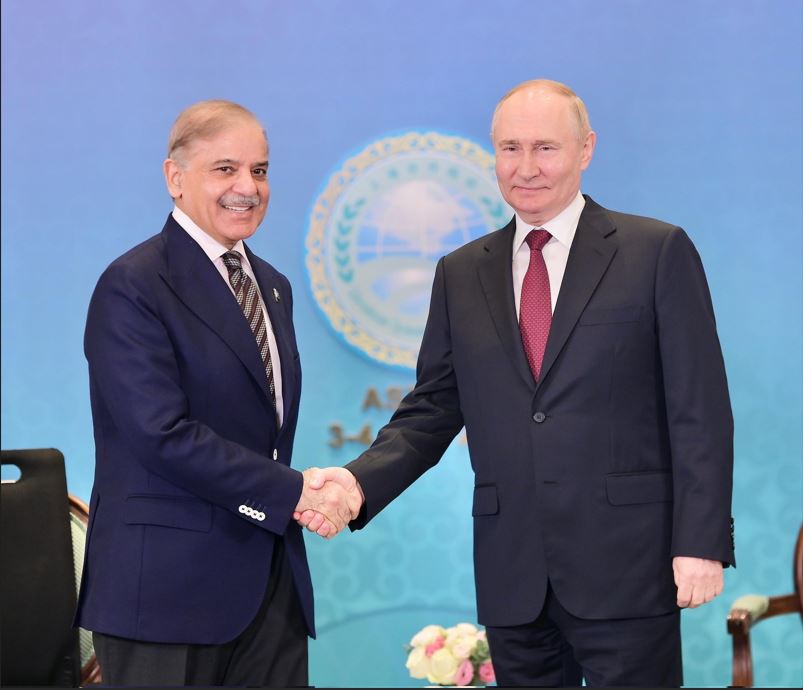
In a significant move towards strengthening bilateral relations, Prime Minister Shehbaz Sharif met with Russian President Vladimir Putin on Wednesday in Astana, Kazakhstan, on the sidelines of the Shanghai Cooperation Organisation (SCO) summit. The discussions centered around reviving and expanding the economic ties that once thrived between the two nations.
Prime Minister Sharif, in his televised opening remarks, reminisced about the robust bilateral trade between Pakistan and Russia during the 1950s and 1960s. He highlighted the era when Pakistan imported machinery and exported leather and other commodities to Russia, establishing a mutually beneficial barter system. This historical context set the tone for the meeting, underscoring the potential for rekindling and surpassing past economic engagements.
At present, the bilateral trade between Pakistan and Russia stands at approximately $1 billion. However, both leaders acknowledged the immense potential for growth by addressing and overcoming financial and banking challenges. Prime Minister Sharif expressed confidence that enhancing trade ties would equally benefit both nations. He stated, “Currently, our bilateral trade stands at around $1 billion, which could be expanded by overcoming financial and banking matters.” The meeting in Astana was not the first encounter between the two leaders. Prime Minister Sharif recalled their earlier interaction in Samarkand, which had laid the groundwork for their current discussions. He congratulated President Putin on his re-election, expressing hope for continued progress in the Russian Federation under his leadership. The prime minister noted the positive trajectory of bilateral relations over the past several years, describing it as a matter of “great comfort.”
Prime Minister Sharif conveyed his readiness to work closely with President Putin to further cement bilateral ties. He emphasized the value of leveraging President Putin’s experience and leadership to benefit both countries. The premier thanked the Russian government for a recent oil shipment to Pakistan, indicating a desire to build on this cooperation. He stated that Pakistan-Russia relations were independent of geopolitical influences, rooted instead in longstanding business ties.
President Putin, in his remarks, echoed the sentiment of improved relations, attributing this progress to the trade linkages between the two countries. He recalled their previous discussion in Samarkand, where they explored ways to enhance bilateral relations. Putin highlighted the potential for increased cooperation in energy and agriculture, expressing his readiness to collaborate with Pakistan in the field of food security. The mutual desire to expand trade and economic cooperation was evident throughout the meeting. Both leaders recognized the strategic importance of their partnership in various sectors, including energy, agriculture, and food security. The discussions aimed at identifying specific areas where both nations could collaborate more effectively to achieve tangible results.
Energy cooperation emerged as a pivotal area of discussion. With Pakistan facing energy shortages and Russia being a major energy producer, the potential for collaboration in this sector is significant. The recent oil shipment from Russia to Pakistan is a testament to this burgeoning partnership. By enhancing energy cooperation, both countries stand to gain economically and strategically, reducing Pakistan’s energy deficit and providing Russia with a reliable market for its energy exports.
Agricultural collaboration is another promising avenue for Pakistan-Russia cooperation. President Putin’s emphasis on promoting food security aligns with Pakistan’s need to enhance its agricultural productivity. By sharing expertise and resources, the two countries can address food security challenges and ensure sustainable agricultural growth. This cooperation could lead to joint ventures, technology transfer, and increased agricultural trade, benefiting farmers and consumers in both nations. For the ambitious goals set during the meeting to materialize, addressing financial and banking challenges is crucial. Both leaders acknowledged the need for improved financial mechanisms and banking facilities to facilitate smoother trade transactions. By working together to resolve these issues, Pakistan and Russia can create a more conducive environment for businesses to thrive, ultimately boosting bilateral trade.
A notable aspect of the discussions was the emphasis on the geopolitical independence of Pakistan-Russia relations. Prime Minister Sharif asserted that their bilateral ties were not driven by any geopolitical situation but rather by a long history of business relations. This perspective highlights the pragmatic approach both nations are adopting, focusing on mutual economic benefits rather than external political pressures.
The meeting between Prime Minister Shehbaz Sharif and President Vladimir Putin marks a significant step towards revitalizing Pakistan-Russia relations. By addressing historical trade ties and exploring new avenues for cooperation in energy, agriculture, and beyond, both countries are poised to enhance their bilateral trade significantly. Overcoming financial and banking hurdles will be key to realizing these goals, ensuring that the benefits of this renewed partnership are equally shared. As Pakistan and Russia embark on this path of enhanced cooperation, the foundations laid during this meeting in Astana could herald a new era of robust economic and diplomatic ties. The commitment to leveraging each other’s strengths and the shared vision for future collaboration promise a bright future for Pakistan-Russia relations, fostering stability and prosperity for both nations.
